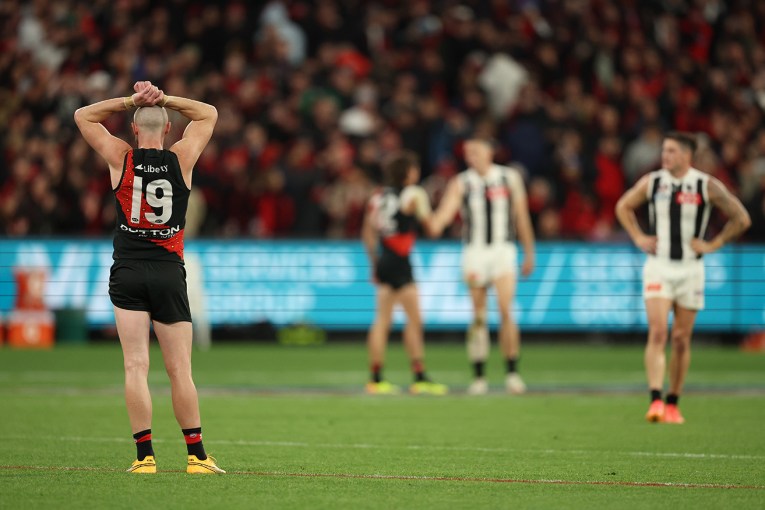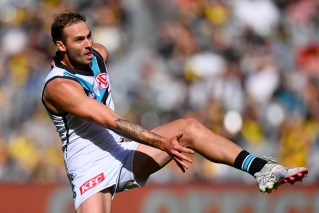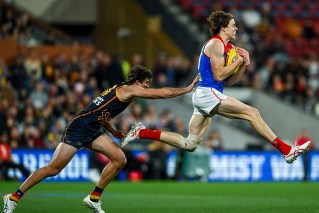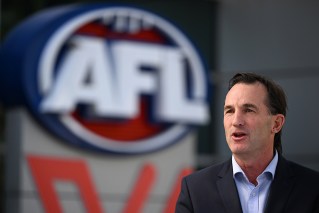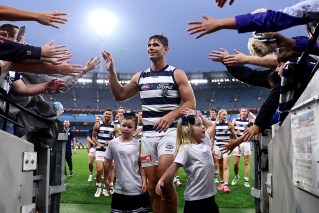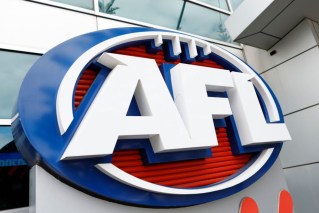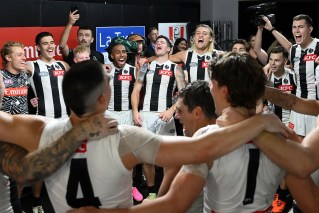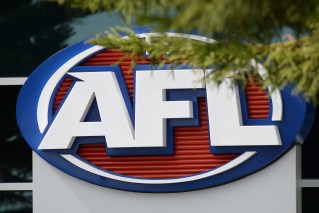‘Bomber’ Thompson: The return of a football enigma

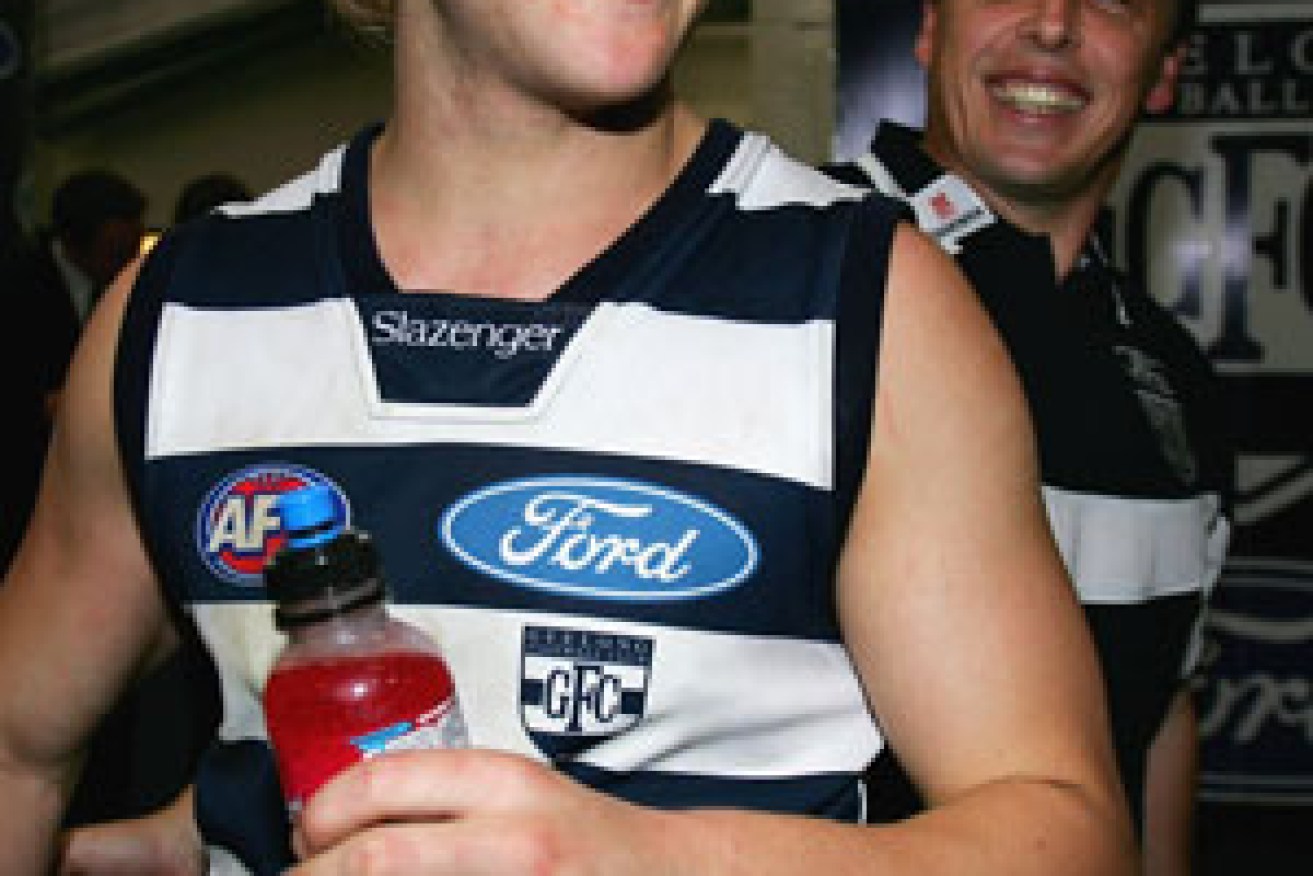
Days of innocence: with a young Gary Ablett. Picture: Getty
Mark ‘Bomber ‘ Thompson says he is “nervous” about Friday night, and well he might be. He is a dual premiership coach with one of the best winning rates in history (62 per cent) from his decade at Geelong, so he scarcely has anything to prove, but this is a new challenge and a big one.
Back in the driver’s seat, Bomber Thompson resumes as a matchday head coach when his beloved Essendon meets North Melbourne at Etihad Stadium.
He has had three years from the end of 2010 out of the main seat, working in behind James Hird before his old teammate was suspended for his involvement in Essendon’s controversial 2011-12 conditioning program.

Back in the driver’s seat at Essendon. Picture: Getty
Thompson previously said, when he left Geelong, that he was ready to try something else in his life. Yet here he will be up in the coach’s box, managing, cajoling and teaching, and one of his closest allies thinks it is precisely where he should be.
“He’s a hugely competitive man,” says Brendan McCartney, longtime assistant to Thompson at Geelong and now head coach of Western Bulldogs, one of three current AFL coaches spawned from that nursery.
When he left a year early, it peeved Cats’ president Frank Costa, who had a handshake agreement with him.
“He was born into the AFL environment when it was dog-eat-dog. There was no time to develop young players, it was just brutal from day one and he came through that. He gets up for match day. He knows how important that is, but he also understands that there’s a process that prepares for that day, too. Those Essendon boys will enjoy being coached by him.”
The question is whether he is ready, does he have the edge that he had at Geelong from 2000-2010?
He says that he does, and it is true to say that under Hird last year, Thompson found himself waking at 1am almost every day and reading the newspapers online to see what was being said. It was an indication that the old fire had been stoked, but to what extent will unfold over the next few months.
Essendon supporters might have a love for their former premiership captain and back pocket general, but they also heard what he said at the end of 2010. “I’m tired of coaching. I don’t want to coach anymore,” were the precise words.
He was about to re-marry following the breakup of his first marriage, and he had made truckloads of money from a development project outside Geelong. He did not sound like he was coming back.
Hence Essendon people are anxious, and so is the coach.
He could not work with Kevin Sheedy because Sheedy was habitually late, even for important meetings.
“You just don’t know how you’re going to handle it,” he told the media on Tuesday. “You know that you’ve done it before but every time it confronts you, you’re saying ‘I wonder if I’ve still got it’. We’ll find out I suppose.”
What made Bomber Thompson so good as a coach? A myriad of factors is the answer. In some ways he fits the stereotype of the coach, as a solid back pocket man, not a champion, but fearless and hard, like Kevin Sheedy, his own coach at Essendon. Out on the field he ran the show, from an early age, and off the field he was kicking goals as well.
“People forget that he was running his own electrical business at 21,” McCartney told The New Daily. “That’s 30 years ago. He was a self-made man who knew how to get things done.”
In other ways, he did not fit neatly into the coach’s box. He could be difficult to handle, enigmatic.

Days of innocence: with a young Gary Ablett in 2005. Picture: Getty
He was angry with Geelong’s 2006 review of football operations headed up by chief executive Brian Cook, and he carried it with him. When he left a year early and without much warning, it peeved Cats’ president Frank Costa, who had a handshake agreement with him.
Geelong, of course, ploughed on and won another flag in 2011 with Chris Scott as head coach, but the tension will be there for a long time. Thompson sat down for lunch with Brian Cook last year and they sorted some differences to ensure that he can go back to the club someday, for reunions and the like, without angst.
His treatment of Ablett in 2010 was shoddy, and hypocritical.
“He’s a brilliant coach, a brilliant football brain,” said McCartney. “People don’t understand that, necessarily, because he doesn’t go out saying it. He doesn’t care what perception people have of him outside.
“He measures people and players and teams against things that stand the test of time,” McCartney said. “He’s got amazing experience in the game, going right back to his time in the 1980s when he was surrounded by hard uncompromising men, people who were talented and hard and he often spoke about how hard they were on each other. He thinks that the basics that stood out then still stand out now.
“He’s got a great understanding of what’s important and what’s not. He knows how games are won and how they’re lost and he knows what type of personality and what type of player can take a club forward. If it’s not relevant, he’s not interested.”
Thompson is methodical. He could not work with Kevin Sheedy when he was made an assistant coach at Essendon in the 1990s, because Sheedy was habitually late, even for important meetings.
Thompson likes to be well-organised; in fact Gary Ablett Jr once called him ”controlling”. He is obsessive about good training; about training to play well. He has a host of basics that he follows and rarely shifts from them, yet he is innovative. He created the high-octane, down-the-corridor running game Geelong perfected in 2007 as the antidote to flooding, a game-style that changed the code.
Bomber Thompson works to the beat of his own drum. When he finally decided he would join Hird at Essendon he did not call anyone at the club.
Geelong came to be known as an attacking team, but people forget how good the Cats were defensively. “The attacking part of it came last,” said McCartney. “He worked with the way they played around the ball first and then he drove the defensive side like a maniac. He couldn’t accept that a man wouldn’t be on his opponent when the ball turned over. The ball movement part of it was the last thing he put in place.”
Yet he could surprise people. His treatment of Ablett in 2010, when the Brownlow medallist was sitting on an irresistible contract offer from the Gold Coast Suns, was shoddy, and hypocritical.
Thompson continually prodded Ablett to re-sign with Geelong, even saying at the season launch: “Seven hundred people in the room heard Gary Ablett say the only reason he plays is to play in a premiership. So Gary, you’d be more of a chance (here) than at the other mob offering all that money.”
But when the time came he left himself, along with Ablett.

The premiership captain with his coach, Kevin Sheedy. But they struggled to work together. Picture: Getty
Bomber Thompson works to the beat of his own drum. When he finally decided he would go ahead and join Hird at Essendon in the pre-season of 2011, he did not call anyone at the club. One afternoon at Essendon Grammar’s sports fields he walked out on to the training track, and found Hird. “Let’s go. Let’s do it,” he said, leaving the club to make an announcement later.
Friday night can’t come quickly enough for him. He has only a year to coach, which is unusual, although that could all change if ASADA delivers a fistful of infraction notices to players under the WADA code. If that happened, Hird’s status would surely be perilous. As for Thompson, he says it is steady-as-she-goes.
“I think it wouldn’t have mattered if ‘Hirdy’ was here this year, we’d try to go through the same sort of development that we’ve done,” he said. “What we’re trying to do is get the players to really understand why and how they play, so that they can read the game and make decisions on the ground for themselves, that we don’t have to make them up in the box.
“That’s a fair bit of work. It might sound easy but to give the players the confidence and courage to control what they do out on the ground is a big thing.”
